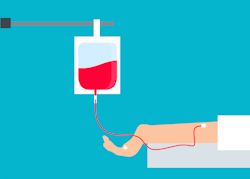Convalescent plasma may benefit some patients with COVID-19
Transfusions of blood plasma donated by people who have recovered from COVID-19 may help some patients hospitalized with the virus, according to a news release from NYU Langone Health describing a new international study.
The treatment, known as convalescent plasma, is still considered experimental by the U.S. Food and Drug Administration (FDA). Plasma contains antibodies, blood proteins that are part of the immune system. Shaped so they can attach to the virus that causes COVID-19, SARS-CoV-2, antibodies glom onto and tag it for removal from the body, researchers say.
The study was led by researchers at NYU Grossman School of Medicine. It showed that among 2,341 men and women, those who received an injection of convalescent plasma soon after hospitalization were 15% less likely to die within a month from COVID-19 than those who did not receive convalescent plasma or those who received an inactive saline placebo.
“Our results show that, overall, patients hospitalized with COVID-19 may derive modest benefit from convalescent plasma, with some patient subgroups benefiting more than others,” says study lead investigator and biostatistician Andrea B. Troxel, ScD. With respect to the groups most likely to benefit, the FDA on December 28, 2021, revised the Emergency Use Authorization for convalescent plasma, limiting its use to patients with diseases that suppress their immune systems, or that receive medical treatments with the same effect.
“Patients with co-existing disease were most likely to show improvement from convalescent plasma, probably because they have the most difficulty producing antibodies to fight their infection,” adds. Troxel. “The infused plasma boosts their body’s ability to fight the virus, but only in the early stage of the disease and before the illness overwhelms their body.”
The treatment, which contains antibodies and other immune cells needed to fight the infection, also appears to benefit those with type A or AB blood.
The current study findings, published in the journal JAMA Network Open online, come from the pooling of patient information from eight recently completed studies in the United States, Belgium, Brazil, India, the Netherlands, and Spain on the effects of convalescent plasma for COVID-19.
For the study, researchers grouped all patient information from smaller, separate clinical investigations about convalescent plasma therapy, including trials at NYU Langone, Albert Einstein College of Medicine, Montefiore Medical Center, Zuckerberg San Francisco General Hospital, and the University of Pennsylvania in Philadelphia. Researchers hoped any benefits or disadvantages in treatment would be easier to spot among the largest possible sample of patients. All trials were randomized and controlled, meaning that the patient had a random chance of being assigned to receive convalescent plasma or not to receive it.
Included in the analysis were data from another multicenter U.S. study published separately in December 2021 in JAMA Internal Medicine. That study in 941 patients hospitalized with COVID-19 showed that patients receiving high doses of convalescent plasma therapy and not on other medications, such as remdesivir or corticosteroids, were likely to benefit from the blood plasma treatment. Study co-primary investigator Mila B. Ortigoza, MD, PhD, an assistant professor in the Departments of Medicine and Microbiology at NYU Langone, says these initial results supported the idea that convalescent plasma could be a feasible treatment option, especially when other therapies are not yet available, as at the beginning of a pandemic.

